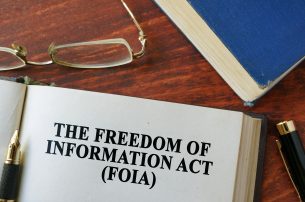Civic Information Journal Shares Insights on Information Accessibility During the Pandemic
The Brechner Center for Freedom of Information today released a special edition of The Journal of Civic Information focused on critical issues of information accessibility raised by the COVID-19 pandemic. The papers were submitted as part of a September 2020 competition organized by the National Freedom of Information Coalition (NFOIC).
Both the Brechner Center and NFOIC are headquartered at the University of Florida College of Journalism and Communications.
 The special edition of the journal, a peer-reviewed, open-access journal of practical scholarship published quarterly, includes four articles addressing issues from transparency in health and death records to public engagement during the pandemic.
The special edition of the journal, a peer-reviewed, open-access journal of practical scholarship published quarterly, includes four articles addressing issues from transparency in health and death records to public engagement during the pandemic.
Following are summaries of each article. The full publication is available at: https://journals.flvc.org/civic/issue/view/5887.
COVID-19, Death Records and the Public Interest: Now is the Time to Push for Transparency
By Amy Kristin Sanders, University of Texas at Austin
Autopsy reports can be a revealing source of information demystifying unexplained deaths. But increasingly, legislatures and courts are taking the details of death investigations off the public record on the grounds of personal privacy — even, as in the case of NASCAR racing star Dale Earnhardt Sr., when the death is a matter of intense public concern. The author urges advocates for open government to harness the urgency surrounding COVID-19 to push against the secrecy trend, securing the access that journalists and researchers need to document the impact of infectious disease on disadvantaged populations.
Transparency and Access in a Pandemic: Understanding the Impact of HIPAA on Government Disclosures
By Al-Amyn Sumar, The New York Times Company
The Health Insurance Portability and Accountability Act (“HIPAA”), a 1996 federal law regulating medical providers and insurers, is often cited incorrectly as a basis for refusing to provide access to information about anything relating to health, even by entities such as police and fire departments that are not covered by the statute at all. This paper addresses some of the most common misconceptions about what HIPAA does and does not cover, focusing on how agencies across the country have inconsistently applied HIPAA when asked for data about COVID-19. It provides a survey of news coverage across the country documenting how widely HIPAA, which applies only to identifiable patient records, is mis-cited as a basis for concealing trends and statistics of public importance.
Secrecy in Death Records: A Call to Action
By Megan Craig and Madeleine Davison, Syracuse University
Access to death certificates enables journalists and researchers to document trends in public health and safety that can inform public policymaking. Journalists have used official death records to document patterns in race, ethnicity, age and location in COVID-19 fatalities, and to debunk myths challenging the deadliness of the virus. However, the authors document in a 50-state survey that only 12 states clearly entitle the press and public to review death records, 33 states heavily restrict or deny access, and five offer only limited access.
Open Budgetary Meetings Amid a Pandemic: Assessing Connecticut’s Various Pathways to Public Engagement During COVID-19
By Jodie Gil and Jonathan L Wharton, Southern Connecticut State University
Connecticut has a uniquely strong and enduring tradition of direct public participation in local governance — a tradition that has been strained by the inability to attend face-to-face meetings due to COVID-19 safety restrictions. After surveying officials from 95 municipalities from across the state, the authors conclude that most city governments found successful workarounds enabling citizens to continue participating in government meetings, though a substantial minority reported a decline in public engagement. Drawing on stories shared by city officials, the authors suggest methods for keeping the public involved when meetings are held remotely.
About The Journal of Civic Information
The Journal of Civic Information is a peer-reviewed, open-access journal of practical scholarship published quarterly since September 2019 by the Brechner Center for Freedom of Information at the University of Florida. Professor Frank D. LoMonte, director of the Brechner Center, is the founding publisher, and David Cuillier, associate professor of journalism at the University of Arizona, is the editor in chief. The Journal’s editorial board is drawn from across the fields of law, journalism, political science, business and others involved in managing and using information about public affairs.
Posted: January 8, 2021
Category: Brechner News
Tagged as: Brechner Center for Freedom of Information, Frank LoMonte, National Freedom of Information Coalition, The Journal of Civic Information



